UZIO Releases Another Major Product Update to Enhance the Functionality of its Payroll, Time Tracking, and HR modules
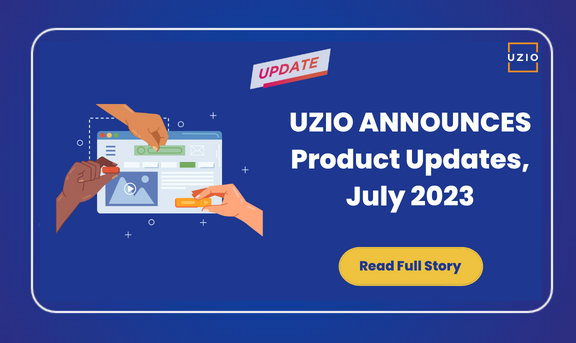
Great Falls, VA. July 14, 2023
UZIO has implemented significant improvements and updates to enhance the functionality of its Payroll, Time Tracking, and HR modules.
Here are some of the exciting highlights of this product release:
UZIO Payroll Enhancements
- Next Day or Same Day Payroll
- Contractor Check Printing
- Add a Pay Stub Note or Message
- Reporting Enhancements
UZIO Time Tracking and Time Off Enhancements
- Terminated Employee’s Visibility in Time Tracking System
UZIO HRIS Enhancements
- Automatic Generation of Employee ID
- Easy Navigation across Employee Profiles
- Employee Listing: Default Display of Active Employees
Global
- New Set of APIs
“Right from the beginning, we have instituted a company culture where our team members make an extra effort to listen to the feedback from our customers and are always on the lookout for ways to improve the end user experience.” said Sanjay Singh, CEO of UZIO. “A number of enhancements in this release are the direct result of a collaborative working relationship we have with our customers where their feedback is listened to and given high priority as we make investment in our product roadmap.“
For more information on these exciting changes, please click on the below link.
UZIO Product Updates, July 2023
About UZIO:
With over 150+ broker partners, 1700+ Employers relying on UZIO and 70+ carriers serving plans, UZIO offers an Integrated HR, Benefits Administration, and Payroll technology platform for brokers, employers, and employees in the SMB space. UZIO enables SMBs to manage HR and compliance with its user-friendly platform and advanced features.
How Do Cannabis Dispensaries Pay Their Employees?
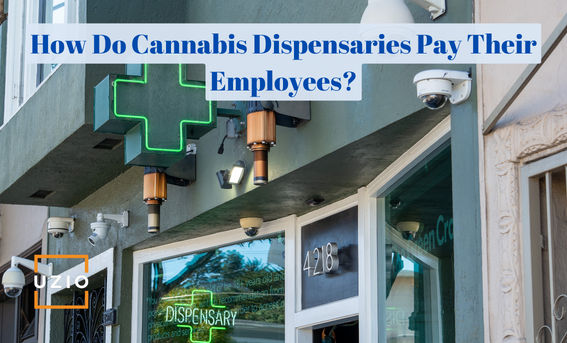
Quick links
-
Introduction
-
The importance of paying employees correctly
-
Do dispensaries pay employees in cash?
-
The risks of paying employees in cash
-
Is paying the employees as independent contractors an option?
-
Are there other options to pay employees?
-
The different types of payroll services available
-
How to choose the right payroll service for your cannabis business
-
Conclusion
Introduction
The cannabis industry is growing rapidly, and with that growth comes a need for qualified employees. Dispensaries are competing for top talent, and one way they do this is by offering competitive wages and benefits.
So, how do cannabis dispensaries pay their employees? The answer varies depending on the dispensary, but there are some general trends.
1. The importance of paying employees correctly
Paying employees correctly is important for a number of reasons. First, it is simply the right thing to do. Employees deserve to be paid for their work, and they should be paid the correct amount. Second, paying employees correctly helps to ensure compliance with labor laws. There are a number of labor laws that govern how employees must be paid, and failing to comply with these laws can result in fines and penalties. Third, paying employees correctly helps to build trust and goodwill between the dispensary and its employees. Employees who are treated fairly and paid correctly are more likely to be loyal and productive.
2. Do dispensaries pay employees in cash?
Some dispensaries do pay their employees in cash. This is often done because of the challenges of accessing traditional banking services for cannabis businesses. However, paying employees in cash can be risky, as it can be difficult to track and report cash payments. Additionally, paying employees in cash can make it more difficult to comply with labor laws.
3. The risks of paying employees in cash
There are a number of risks associated with paying employees in cash. These risks include:
- It can be difficult to track and report cash payments. This can make it difficult to ensure that employees are being paid correctly and that the dispensary is complying with labor laws.
- It can be difficult to prove that an employee is an independent contractor if they are paid in cash. This can make it more difficult for the dispensary to avoid liability for employment taxes and benefits.
- It can be more difficult to collect unpaid wages if an employee is paid in cash. This is because there is no paper trail to track the payments.
4. Is paying the employees as independent contractors an option?
Another way to pay cannabis dispensary employees is to pay them as independent contractors. This means that the employees are responsible for paying their own taxes and benefits. However, this can be risky for the dispensary, as it can be difficult to determine whether the employees are truly independent contractors.
If you’re illegally operating by paying your employees as 1099 employees, and the labor board happens to walk into your store and see that your employees are being paid improperly, you could face substantial fines.
To determine whether an employee is an independent contractor, the dispensary should consider the following factors:
- The degree of control the dispensary has over the employee. If the dispensary has a lot of control over the employee’s work, then the employee is more likely to be an employee rather than an independent contractor.
- The level of skill required for the work. If the work requires a high level of skill, then the employee is more likely to be an independent contractor.
- The method of payment. If the employee is paid by the hour, then they are more likely to be an employee. However, if the employee is paid a flat fee for their work, then they are more likely to be an independent contractor.
5. Are there other options to pay employees?
In addition to paying employees in cash or as independent contractors, there are a number of other options available. These options include:
- Paying employees through a payroll service. A payroll service can help the dispensary to calculate and withhold taxes, as well as issue paychecks and track employee hours. This ensures that the dispensary is paying its employees correctly and complying with all applicable laws.
- Paying employees through a bank account. This is the most common way to pay employees, and it is the safest and most secure option.
- Paying employees through a pay card. This is a less common option, but it can be convenient for employees who do not have a bank account.
6. The different types of payroll services available
There are a number of different payroll services available. The best service for you will depend on your specific needs. Some factors to consider include the size of your business, the location of your business, and the features that you need.
| Payroll Company | Main Features | Pricing |
|---|---|---|
| Greenleaf | Automated payroll processing, tax compliance, benefits administration, HR management | Custom pricing based on business size and needs. Contact for pricing |
| People Guru | Full-service payroll processing, tax compliance, HR tools, time and attendance tracking | Custom pricing based on business size and needs |
| SurePayroll | Online payroll processing, tax compliance, employee self-service, benefits administration | Starts at $19.99/month + $5/employee per month |
| UKG | Full-service payroll processing, tax compliance, HR tools, time and attendance tracking | Custom pricing based on business size and needs |
| UZIO | Tax calculation and reporting, employee self-service, benefits administration, leave management, analytics and dashboards, regulatory compliance, integration with HR and accounting software | PEPM (Per Employee Per Month) based transparent pricing available on the website |
| Wurk | Cannabis industry-specific HR software, including payroll processing, time and attendance tracking, and tax compliance | Custom pricing based on business size and needs |
7. How to choose the right payroll service for your cannabis business
When choosing a payroll service, there are a few things to keep in mind:
- Does the software provider have experience working with cannabis companies?
- Does the software provider offer features such as tax calculation and reporting, employee self-service, benefits administration, leave management, analytics and dashboards, and regulatory compliance?
- Does the software provider offer integration with HR and accounting software?
- Does the software provider offer support during the implementation process and ongoing training for employees?
- Is the software scalable to accommodate the needs of a growing cannabis company?
- Does the software provider have a strong reputation for customer support and service?
By considering these factors and using the checklist, cannabis companies can make an informed decision when choosing payroll software that meets their specific needs.
Recommended Reading: Biggest pain point with Payroll and HR software
Conclusion
Paying employees correctly is important for a number of reasons. By following the steps outlined in this blog post, you can ensure that you are paying your employees correctly and complying with all applicable laws.
Overall, choosing the right payroll software provider for a cannabis company is crucial for ensuring accurate and compliant payroll processes. By considering the features, cost, regulatory compliance, and support offered by potential providers, businesses can make an informed decision and select the best software for their needs.
Get in touch with us for an expert-led demo to know more about UZIO payroll services.
Payroll Tax Compliance: Essential Tips for Small Business Owners
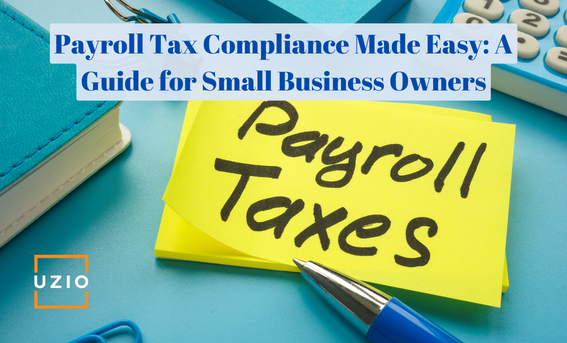
Quick links
-
Introduction
-
Your Payroll Tax Obligations
-
Classify Your Employees Correctly
-
Keep Accurate Payroll Records
-
Stay Updated with Tax Law Changes
-
Calculate and Withhold Taxes Correctly
-
File and Remit Payroll Taxes on Time
-
Monitor and Report New Hires
-
Perform Periodic Payroll Audits
-
Conclusion
Introduction
As a small business owner, navigating the complexities of payroll tax compliance can be a daunting task. Failing to meet your obligations can lead to penalties, fines, and unnecessary stress. In this blog post, we will discuss essential tips to help small business owners stay on top of their payroll tax compliance responsibilities and ensure smooth operations.
1. Your Payroll Tax Obligations
The first step in payroll tax compliance is to understand your obligations. Determine which taxes apply to your business, such as federal income tax withholding, Social Security and Medicare taxes (FICA), and federal and state unemployment taxes (FUTA and SUTA). Familiarize yourself with the applicable tax rates, thresholds, and reporting requirements. Register your company with any state agency that you are found to be liable in. For more information on a state by state basis you can navigate through the state site for guidance and information.
2. Classify Your Employees Correctly
Properly classifying your employees as either employees or independent contractors is crucial. Misclassifying workers can result in costly penalties. Understand the legal criteria for employee classification and consult with legal or tax professionals if you have any doubts. If you are unsure of an employee’s classification be sure to withhold as if the employee is not a contractor and is subject to federal and state taxation. This will avoid any unnecessary penalties and/or interest charges on tax liabilities.
3. Keep Accurate Payroll Records
Maintain accurate payroll records for each employee, including their wages, hours worked, tax withholdings, and benefits. These records should be organized and accessible for at least three years to comply with IRS regulations. If you are using a payroll service be to download and save all your payroll records with each run to ensure you have all the information you will need.
4. Stay Updated with Tax Law Changes
Payroll tax laws are subject to regular updates and changes. Stay informed about federal, state, and local tax law modifications that may impact your business. Subscribe to reputable tax resources, consult with a tax professional, or attend workshops and seminars to stay up to date.
5. Calculate and Withhold Taxes Correctly
Accurate tax calculation and withholding are vital to avoid penalties. Use reliable payroll software or consult with a payroll service provider to ensure correct calculations based on the latest tax rates, exemptions, and deductions. Remember to withhold federal income tax, Social Security tax, Medicare tax, and any applicable state and local taxes.
6. File and Remit Payroll Taxes on Time
Meeting filing and remittance deadlines is crucial to payroll tax compliance. File required tax forms, such as Form 941 or 944 for federal taxes and applicable state tax forms, accurately and on time. Make timely payments of withheld taxes to the appropriate tax authorities.
7. Monitor and Report New Hires
To comply with federal and state laws, report new hires to the appropriate agencies promptly. This helps prevent fraudulent activity, supports child support enforcement efforts, and ensures compliance with reporting requirements.
8. Perform Periodic Payroll Audits
Regularly review your payroll processes and records to identify any discrepancies or errors. Conduct internal audits to verify that your payroll system is functioning correctly and that all necessary tax deductions, benefits, and contributions are being handled accurately.
Seek Professional Assistance: If you find payroll tax compliance overwhelming or have complex payroll structures, consider seeking professional assistance. Hiring a certified public accountant (CPA) or utilizing the services of a payroll provider can help ensure accurate tax calculations, reporting, and compliance.
Payroll tax compliance is a critical aspect of running a small business. By understanding your obligations, maintaining accurate records, staying informed about tax law changes, and seeking professional assistance when needed, you can streamline your payroll processes and avoid costly penalties. Stay proactive and diligent in your payroll tax compliance efforts, and your business will operate smoothly while staying on the right side of the law.
Recommended Reading: Biggest pain point with Payroll and HR software
Conclusion
Payroll tax compliance is a complex and ever-changing landscape, but it is essential for small business owners to stay on top of their obligations. By following the tips in this blog post, you can streamline your payroll processes and avoid costly penalties.
Stay proactive and diligent in your payroll tax compliance efforts, and your business will operate smoothly while staying on the right side of the law.
In addition to the tips mentioned in this blog post, there are a few other resources that small business owners can utilize to help them stay compliant with payroll tax laws. These resources include:
- The IRS website: The IRS website has a wealth of information on payroll tax laws, including forms, instructions, and publications.
- The Small Business Administration (SBA): The SBA offers a variety of resources to help small businesses with payroll tax compliance, including webinars, toolkits, and publications.
- Payroll service providers: Payroll service providers like UZIO can help small businesses with all aspects of payroll, including tax calculation, withholding, filing, and remittance.
By utilizing these resources, small business owners can ensure that they are in compliance with payroll tax laws and avoid costly penalties.
Get in touch with us for an expert-led demo to know more about UZIO payroll services.
How to Create a Fair and Equitable Payroll System for Your Cannabis Dispensary
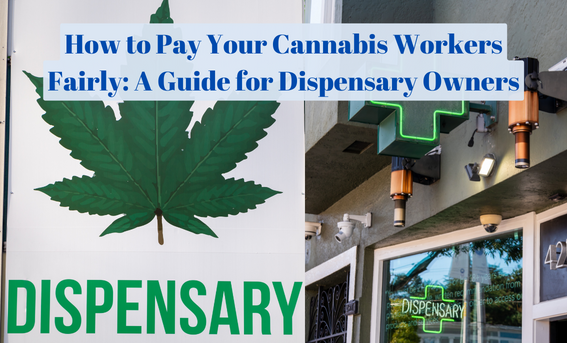
Quick links
-
Introduction
-
Steps to Creating a Fair and Equitable Payroll System
-
Challenges of Creating a Fair and Equitable Payroll System
-
Tips for Creating a Fair and Equitable Payroll System
-
How a Payroll Service Provider Like UZIO Can Help
-
Conclusion
1. Introduction
A fair and equitable payroll system is one that pays employees fairly for their work, regardless of their race, gender, age, or other protected class. It is also a system that is transparent and easy to understand, so that employees know what they are being paid and why.
There are many benefits to having a fair and equitable payroll system. For one, it can help to attract and retain top talent. Employees are more likely to stay with an employer if they feel that they are being treated fairly and that their pay is competitive.
A fair and equitable payroll system can also help to improve employee morale. When employees feel that they are being treated fairly, they are more likely to be happy and productive at work.
Finally, a fair and equitable payroll system can help to protect your business from legal liability. If you are not paying your employees fairly, you could be subject to a wage and hour lawsuit.
2. Steps to Creating a Fair and Equitable Payroll System
There are a few steps you can take to create a fair and equitable payroll system for your dispensary.
- Define the roles and responsibilities of each position. What are the duties and responsibilities of each position in your dispensary? Once you have a clear understanding of the roles and responsibilities of each position, you can start to develop a pay range for each position.
- Set pay ranges for each position. When setting pay ranges, you need to consider a number of factors, including the job duties, the experience and education required, and the market rate for similar positions in your area.
- Establish a pay review process. You should establish a regular pay review process to ensure that your employees’ pay is still fair and equitable over time. This process should include a review of the job duties, the employee’s performance, and the market rate for similar positions.
- Monitor and adjust pay as needed. You should monitor your payroll system on a regular basis to ensure that it is still fair and equitable. If you find that there are any inequities, you should adjust the pay ranges or the pay review process as needed.
3. Challenges of Creating a Fair and Equitable Payroll System
There are a few challenges you may face when creating a fair and equitable payroll system.
-
- Legal compliance. You need to make sure that your payroll system complies with all applicable laws, including federal, state, and local laws.
- Employee morale. If employees feel that they are not being paid fairly, it can damage morale and lead to turnover.
- Budget constraints. You may have budget constraints that limit how much you can pay your employees.
4. Tips for Creating a Fair and Equitable Payroll System
Here are a few tips for overcoming the challenges of creating a fair and equitable payroll system:
-
- Get input from employees. Ask your employees for their input on how to make the payroll system more fair and equitable.
- Use a payroll service provider. A payroll service provider can help you to ensure that your payroll system is compliant with all applicable laws and that it is easy to manage.
- Stay up-to-date on legal changes. The laws governing payroll can change frequently, so it is important to stay up-to-date on the latest changes.
5. How a Payroll Service Provider Like UZIO Can Help
A payroll service provider like UZIO can help you to create a fair and equitable payroll system for your dispensary in a number of ways.
- Compliance: UZIO can help you to ensure that your payroll system is compliant with all applicable laws. This includes federal, state, and local laws.
- Efficiency: UZIO can help you to streamline your payroll process, so that you can save time and money.
- Accuracy: UZIO can help you to ensure that your payroll is accurate, so that you can avoid errors and penalties.
- Peace of mind: UZIO can take the worry out of payroll, so that you can focus on running your business.
In addition to these benefits, UZIO is also designed for small businesses. This means that UZIO understands the unique challenges that small businesses face when it comes to payroll. It offers a variety of features and services that are specifically designed to help small businesses, such as:
- Simple pricing: UZIO’s pricing is simple and transparent, so you know exactly what you’re paying.
- Easy to use: UZIO’s software is easy to use, even if you’re not familiar with payroll.
- Support: It offers 24/7 support, so you can always get help when you need it.
If you’re looking for a payroll service provider that can help you to create a fair and equitable payroll system for your dispensary, then UZIO is a great option. It offers a variety of features and services that are specifically designed to help small businesses, and they have a team of experts who are ready to help you get started.
Recommended Reading: Biggest pain point with Payroll and HR software
6. Conclusion
Creating a fair and equitable payroll system is important for attracting and retaining top talent, improving employee morale, and protecting your business from legal liability. By following the tips in this blog post, you can create a payroll system that is fair and equitable for your employees.
If you are not sure how to create a fair and equitable payroll system for your dispensary, you can contact UZIO for help. They can help you to assess your current payroll system and make recommendations for how to improve it.
To know more about UZIO payroll solution for the Cannabis Industry and get in touch with us for an expert-led demo.
Navigating Multistate Payroll: Key Considerations and Best Practices
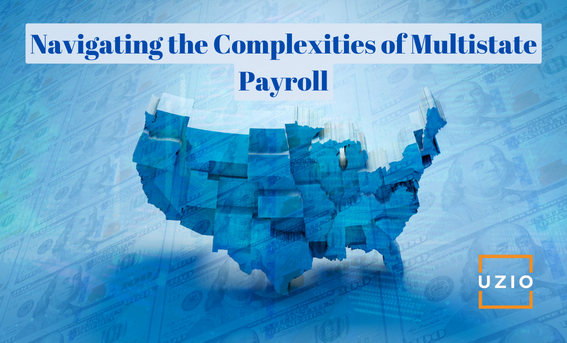
Quick links
-
Introduction
-
Employee Residence vs. Work Location
-
State Income Tax Withholding
-
Nexus and Employment Laws
-
State Unemployment Insurance (SUI)
-
Remote Work Considerations
-
Conclusion
1. Introduction
Managing payroll can be complex, and it becomes even more challenging when you have employees working in multiple states. Each state has its own unique tax laws, labor regulations, and reporting requirements, making multistate payroll a demanding task. In this blog post, we will explore the essential considerations and best practices for effectively handling multistate payroll.
2. Employee Residence vs. Work Location
One of the initial challenges in multistate payroll is determining which state’s tax laws apply to each employee. While some states tax employees based on their residence, others consider the location where work is performed. It’s crucial to understand the rules and regulations of each state to ensure accurate tax withholding and reporting.
3. State Income Tax Withholding
When processing payroll for employees in multiple states, you need to accurately calculate state income tax withholding for each employee based on the applicable state tax rates and any reciprocity agreements between states. Consult state tax authorities or use reliable payroll software to ensure compliance and avoid under or over-withholding.
4. Nexus and Employment Laws
Employers must also be aware of the concept of “nexus” in each state where they have employees. Nexus determines whether an employer is subject to that state’s employment laws, such as minimum wage requirements, overtime regulations, and paid leave provisions. Understand the employment laws in each state to meet your obligations as an employer.
5. State Unemployment Insurance (SUI)
Each state has its own unemployment insurance program, and employers are typically required to contribute to the SUI fund in the states where they have employees. Familiarize yourself with the SUI requirements of each state, including registration, tax rates, and reporting obligations.
6. Remote Work Considerations
With the rise of remote work, many employees may work from a different state than their employer’s physical location. This can create additional complexities in multistate payroll. Understand the implications of remote work, including tax obligations and compliance with employment laws, in both the employer’s state and the employee’s state of residence.
Recommended Reading: Biggest pain point with Payroll and HR software
7. Conclusion
Managing multistate payroll requires a comprehensive understanding of tax laws, employment regulations, and reporting requirements in each state where you have employees. By carefully considering employee residence and work locations, accurately calculating state income tax withholding, complying with employment laws, and leveraging technology and professional expertise, you can streamline your multistate payroll processes while maintaining compliance with all relevant state requirements.
Get in touch with us for an expert-led demo to know more about UZIO payroll services.
How to Stay Up-to-Date on Changing Cannabis Payroll Regulations in Real Time

Quick links
-
Introduction
-
Subscribe to industry publications and newsletters
-
Follow government agencies and industry organizations on social media
-
Attend industry events
-
Hire a payroll service provider that specializes in cannabis payroll
-
Some additional tips
-
Conclusion
1. Introduction
The cannabis industry is constantly evolving, and so are the payroll regulations that govern it. It can be difficult to stay up-to-date on the latest changes, especially if you’re not a legal expert. This can lead to compliance issues, which can be costly and time-consuming to resolve.
Here are a few things you can do to stay up-to-date on changing cannabis payroll regulations in real time:
2. Subscribe to industry publications and newsletters
There are a number of industry publications and newsletters that can keep you informed of the latest changes in cannabis payroll regulations. These publications often have articles that explain the changes in detail and provide guidance on how to comply.
3. Follow government agencies and industry organizations on social media
Many government agencies and industry organizations that regulate the cannabis industry have active social media presences. These organizations often post updates about changes in regulations on their social media pages.
- The U.S. Department of Labor
- The U.S. Treasury Department
- The Internal Revenue Service
- The National Cannabis Industry Association
- The Marijuana Business Association
4. Attend industry events
There are a number of industry events that are held throughout the year that can provide you with updates on cannabis payroll regulations. These events often feature speakers who are experts in cannabis payroll law.
- MJBizCon – National Marijuana Business Conference & Expo
- NoCo Hemp Expo
- The Cannatech Expo
- USA CBD Expo
- CannaCon Detroit
- NECANN 2023 New York Cannabis Convention
- Vermont Hemp & Cannabis Convention
5. Hire a payroll service provider that specializes in cannabis payroll
A payroll service provider that specializes in cannabis payroll can help you stay up-to-date on changing regulations. These providers often have teams of experts who are constantly monitoring the latest changes and updates. They will notify you of any changes that affect your business, so you can take the necessary steps to comply.
How UZIO can help?
UZIO is a payroll service provider that specializes in cannabis payroll. They understand the unique challenges that cannabis businesses face, and offer a variety of features and services to help you stay compliant with the latest regulations.
- Real-time compliance updates: UZIO monitors the latest changes in cannabis payroll regulations and can update any of the functionality once there is a requirement or a request is received with a very short turnaround time. This is possible because UZIO has full control over the platform as it owns and manages the solution and hence is responsible for any update and upgrade of the solution in-house.
- Expert support: Their team of experts is available to help you implement the latest changes in your payroll system.
- Easy-to-use software: UZIO’s payroll software is easy to use, even if you’re not familiar with payroll. You will have full control and customization options as per your requirements.
- Affordable pricing: Their pricing is simple and transparent, so you know exactly what you’re paying. Please visit the pricing page to know more.
If you’re looking for a payroll service provider that can help you stay up-to-date on changing cannabis payroll regulations, then UZIO is a great option. They offer a variety of features and services to help you stay compliant and avoid costly mistakes.
6. Some additional tips
Here are some additional tips for staying up-to-date on changing cannabis payroll regulations:
- Set up a Google Alert for “cannabis payroll regulations.” This will send you an email notification whenever there is a new article or blog post about cannabis payroll regulations.
- Join a cannabis payroll industry group or forum. This is a great way to connect with other cannabis businesses and learn about the latest changes in regulations.
- Subscribe to a cannabis payroll newsletter. This is a great way to stay up-to-date on the latest changes in regulations and receive helpful tips and advice.
Recommended Reading: Biggest pain point with Payroll and HR software
7. Conclusion
Staying current on changing cannabis payroll regulations is important for compliance and peace of mind. By following the tips in this blog post, you get regular alerts and updates on the latest changes and avoid costly mistakes.
To learn more about how UZIO can help you stay up-to-date on changing cannabis payroll regulations, please contact us today.
To know more about UZIO payroll solution for the Cannabis Industry and get in touch with us for an expert-led demo.
Colorado Paid Family Leave Tax: An Informational Guide
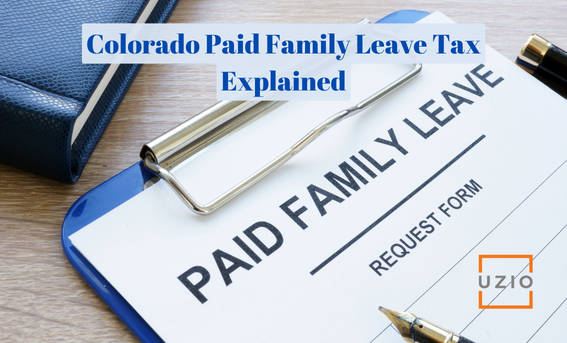
Quick links
-
Introduction
-
Understanding Colorado Paid Family Leave
-
Calculation of the Colorado Paid Family Leave Tax
-
Coordination with Other Benefits
-
Conclusion
1. Introduction
Colorado’s Paid Family Leave (PFL) program provides crucial benefits to employees who need time off to care for themselves or their family members. As an employer in Colorado, it’s essential to understand the requirements and implications of the Colorado Paid Family Leave tax. In this guide, we will provide you with an overview of the program, explain how the tax is calculated, and outline your responsibilities as an employer.
2. Understanding Colorado Paid Family Leave
The Colorado Paid Family Leave program is designed to provide eligible employees with wage replacement benefits when they take time off for qualifying reasons, such as the birth or adoption of a child, caring for a family member with a serious health condition, or their own serious health condition. The program is funded through a payroll tax, which both employers and employees contribute to.
3. Calculation of the Colorado Paid Family Leave Tax
The tax rate for the Colorado Paid Family Leave program is determined annually by the Colorado Department of Labor and Employment (CDLE). The tax is a percentage of an employee’s wages, up to a certain maximum wage cap. The maximum wage cap and the tax rate may vary from year to year, so it’s important to stay updated with the latest information from the CDLE.
As an employer, you have specific responsibilities related to the Colorado Paid Family Leave tax. These include:
- Employee Deductions: You are responsible for deducting the appropriate amount from each employee’s wages to cover their contribution to the Colorado Paid Family Leave tax. The deduction should be based on the tax rate set by the CDLE.
- Employer Contributions: In addition to deducting the employee’s portion, you are also required to contribute to the Colorado Paid Family Leave tax on behalf of your employees. The employer contribution rate is set by the CDLE.
- Reporting and Remittance: You must accurately report and remit the collected taxes to the CDLE according to the prescribed schedule. Failure to do so can result in penalties.
- Employee Notifications: Inform your employees about the Colorado Paid Family Leave program, including their rights and obligations under the law. You may need to provide certain notices to employees regarding their eligibility, benefit amounts, and application procedures.
4. Coordination with Other Benefits
It’s important to note that the Colorado Paid Family Leave program may coordinate with other benefits such as the federal Family and Medical Leave Act (FMLA) or other state-based leave programs. Ensure you understand the interplay between these various programs and any employer obligations or requirements associated with each.
Recommended Reading: Biggest pain point with Payroll and HR software
Conclusion
To fulfill your responsibilities as an employer, it is crucial to stay informed about the latest developments and updates regarding the Colorado Paid Family Leave tax. Regularly visit the CDLE’s official website, subscribe to relevant newsletters or notifications, and seek guidance from trusted sources to stay up to date with any changes to the program. Compliance with the Colorado Paid Family Leave tax is essential for employers in Colorado. By understanding the program, calculating the tax correctly, fulfilling your employer responsibilities, and staying informed about any updates, you can ensure smooth implementation of the program and provide valuable benefits to your employees. Remember to consult with legal and tax professionals or refer to official resources for specific guidance related to your unique situation as an employer in Colorado.
Get in touch with us for an expert-led demo to know more about UZIO payroll services.
Cannabis Tax 101: Navigating 280E Challenges and Future Opportunities

Quick links
-
Introduction
-
Understanding IRS 280E
-
Implications of IRS 280E on Cannabis Businesses
-
Compliance Strategies for Navigating IRS 280E
-
Challenges Faced by Cannabis Businesses Under IRS 280E
-
Compliance Considerations and Best Practices
-
Strategies for Managing IRS 280E Constraints
-
Conclusion
1. Introduction
Navigating the cannabis industry’s tax landscape can feel like walking a tightrope, especially with the complexities of the IRS 280E tax code. Originally intended to curb deductions for illicit drug traffickers, 280E has become a significant challenge for state-legal cannabis businesses. It denies deductions for ordinary business expenses, leaving cannabis operators to shoulder a heavier tax burden compared to other industries.
This blog explores the intricacies of IRS 280E, its financial implications, and strategies to navigate its challenges effectively. Whether you’re a seasoned entrepreneur or new to the cannabis space, understanding this tax code is essential to staying compliant and optimizing your operations.
2. Overview: What is IRS 280E?
In the ever-evolving landscape of the cannabis industry, one regulatory aspect that significantly impacts businesses is the IRS 280E Tax Code. This section will provide an overview of IRS 280E, shedding light on its definition, purpose, and how it applies specifically to the cannabis industry.
1. Definition and Purpose of IRS 280E
The IRS 280E Tax Code provision was introduced as a response to the federal classification of cannabis as a Schedule I controlled substance. This provision restricts businesses engaged in the sale, cultivation, or distribution of controlled substances from deducting ordinary business expenses when calculating their federal taxable income, except for the cost of goods sold (COGS).
2. Background on its Application to the Cannabis Industry
The application of IRS 280E to the cannabis industry has been a point of contention for many business owners. Despite the legalization of cannabis for medical or recreational use in numerous states, the federal government still classifies it as illegal. Consequently, cannabis businesses are subject to the limitations imposed by IRS 280E, resulting in unique challenges and financial implications.
3. Key Provisions and Limitations
Under IRS 280E, cannabis businesses are unable to deduct common business expenses such as rent, employee salaries, marketing costs, and other typical operating expenses. This limitation significantly impacts the profitability and effective tax rates of cannabis businesses, as they are taxed on their gross income rather than their net income.
However, it’s important to note that while ordinary business expenses are disallowed, cannabis businesses can still deduct the cost of goods sold (COGS). The COGS refers to the direct expenses incurred in the production or acquisition of cannabis products, such as the cost of raw materials, direct labor, and directly related overhead costs.
Understanding the definition, purpose, and key provisions of IRS 280E lays the foundation for comprehending the implications, challenges, and compliance considerations that the cannabis industry faces. In the subsequent sections, we will explore these aspects in greater detail, providing valuable insights to help businesses navigate the complex tax landscape of the cannabis industry.
3. Implications of IRS 280E on Cannabis Businesses
IRS 280E significantly affects the financial health of cannabis businesses. Here’s how:
- Limited Tax Deductions: Ordinary business expenses such as marketing, rent, and salaries are non-deductible, increasing taxable income.
- Higher Effective Tax Rates: Businesses are taxed on gross profits rather than net, leading to substantial financial strain.
- Reduced Cash Flow: The inability to offset expenses limits reinvestment opportunities and operational growth.
4. Compliance Strategies for Navigating IRS 280E
Navigating the complexities of IRS 280E requires cannabis businesses to adopt proactive compliance strategies. Below are key approaches:
1. Accurate Record-Keeping
Maintain detailed documentation of all transactions, particularly those related to the Cost of Goods Sold (COGS). Properly categorized records can significantly reduce audit risks.
2. COGS Optimization
Focus on maximizing deductible COGS expenses, such as inventory costs and direct production-related expenses, while adhering to IRS guidelines.
3. Expert Guidance
Partner with tax professionals specializing in cannabis taxation. Their expertise ensures accurate compliance and strategic tax planning.
4. Invest in Technology
Use payroll and HR solutions like UZIO to automate compliance tracking and streamline processes. Learn more about automating payroll and compliance.
5. Stay Updated on Regulations
IRS and state tax laws are subject to change. Regularly review updates to ensure ongoing compliance.
5. Challenges Faced by Cannabis Businesses Under IRS 280E
Operating under IRS 280E presents unique hurdles for cannabis businesses. Below are the most pressing challenges:
1. Limited Tax Deductions
Businesses cannot deduct ordinary operating expenses, such as rent, salaries, and marketing costs, resulting in higher effective tax rates. This limitation significantly impacts profitability.
2. Strained Cash Flow
With increased tax liabilities and limited deductions, many cannabis businesses struggle with cash flow, making it harder to reinvest or scale operations.
3. Complexity in Financial Management
Accurately allocating expenses to COGS and maintaining compliance with shifting regulations requires meticulous financial planning and expertise.
4. Limited Access to Banking Services
Due to federal classification, cannabis businesses often face difficulties accessing traditional banking services, compounding their financial management issues.
5. Compliance Risks
Missteps in compliance, whether due to poor record-keeping or misclassification of expenses, can lead to audits, penalties, and further financial strain.
6. Compliance Considerations and Best Practices
Navigating IRS 280E successfully requires cannabis businesses to adopt proactive compliance strategies and best practices. Here’s how to stay ahead:
1. Maintain Detailed Records
Accurate and meticulous record-keeping is essential. Maintain documentation of all expenses, particularly those related to the cost of goods sold (COGS), as they are deductible.
2. Consult Tax Experts
Work with professionals who specialize in cannabis tax laws. Their expertise can help optimize your tax strategy while ensuring compliance.
3. Prioritize COGS Allocation
Carefully allocate eligible expenses to COGS. This includes costs directly tied to production, such as raw materials and labor. Proper categorization can significantly reduce tax liability.
4. Regularly Monitor Regulations
Stay informed about changes in federal and state tax laws. Regulations impacting IRS 280E can shift, and businesses must adapt promptly to maintain compliance.
5. Invest in Tax-Compliance Tools
Use advanced software solutions for accurate expense tracking, tax calculation, and reporting. Tools like UZIO’s payroll system can simplify compliance with tax codes while streamlining payroll and HR operations.
Recommended Reading: Biggest pain point with Payroll and HR software
7. Strategies for Managing IRS 280E Constraints
Overcoming the challenges posed by IRS 280E requires a combination of strategic planning, operational efficiency, and innovative approaches. Here are actionable strategies cannabis businesses can adopt:
1. Optimize Cost Allocation to COGS
Ensure all allowable expenses are correctly allocated to the Cost of Goods Sold (COGS). This may include expenses like cultivation, manufacturing, and direct labor. Proper allocation minimizes taxable income and reduces overall tax liability.
2. Focus on Operational Efficiency
Streamline operations to reduce costs and increase profitability. Evaluate processes for redundancies and invest in automation tools to improve productivity.
3. Evaluate Legal Entity Structures
Consider structuring your business in a way that allows separate entities for operations and management. This may provide strategic advantages in minimizing exposure to 280E.
4. Explore State Tax Credits and Incentives
Some states offer tax credits or deductions for cannabis businesses. Leverage these opportunities to offset your federal tax burden.
5. Build Reserves for Tax Payments
Given the higher effective tax rates under 280E, maintain robust financial reserves to cover tax liabilities. This ensures liquidity and avoids disruptions during tax season.
6. Partner with Specialized Accountants
Engage accountants and consultants with expertise in cannabis taxation. Their insights can help navigate legal complexities and optimize financial planning.
8. Conclusion and Call to Action
Navigating the complexities of IRS 280E can be challenging for cannabis businesses, but with strategic planning, operational efficiency, and expert guidance, compliance is achievable. By understanding the tax implications, implementing proactive measures, and leveraging tools like payroll and financial management software, businesses can mitigate risks and optimize profitability.
At UZIO, we understand the unique challenges faced by cannabis businesses. Our comprehensive payroll and HR solutions are designed to help you streamline operations, ensure compliance, and focus on growth. From automated tax filings to detailed reporting, our tools simplify the complexities of payroll and HR management for cannabis companies.
Take Action Today! Explore how UZIO can help your business navigate IRS 280E and beyond. Contact Us for a personalized consultation or schedule a demo to see our solutions in action.
To know more about UZIO payroll solution for the Cannabis Industry and get in touch with us for an expert-led demo.
Use Case – Cannabis Company Struggling to find an integrated Payroll, HRIS, Benefits Solution
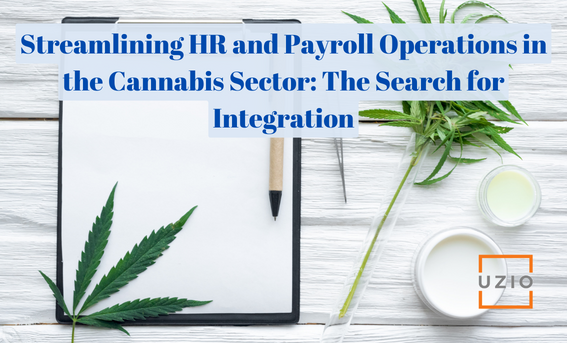
Quick links
-
Introduction
-
Challenge: HRIS, Payroll and Benefits not working seamlessly
-
Solution: UZIO – Empowering Cannabis Businesses
-
Results: Streamlined HR, Payroll & Benefits Operations
-
Conclusion: UZIO – A Reliable Partner for Cannabis Payroll
1. Introduction
Our client is a cannabis retailer with flagship locations spread across seven states. It offers a robust selection of high-quality products through its premium retail stores, proprietary delivery service, as well as curbside and in-store pick up. It is a public company with more than five hundred employees across various locations. It was using a number of different vendors to complete basic functions like onboarding new employees, offering them benefits, running their payroll etc. Because different vendors’ solutions did not integrate with each other, the HR team was tasked with maintaining data across different systems in sync by copying and pasting data from one system to another. This was a significant issue which caused errors. HR team had to work overtime and members of the HR team were very demotivated and ready to quit. This use case highlights how our client overcame these challenges by partnering with UZIO, a specialized payroll, HR and benefits provider for the cannabis industry.
2. Challenge: HRIS, Payroll and Benefits not working seamlessly
Our client was using different systems for HRIS, Payroll and Benefits. When hiring new employees, the HR team had to first onboard the employee into the HRIS system and then manually push the employee data to the payroll system. When an employee was moved from one location to another, the payroll system required them to “terminate” the employee in one location and “hire” the employee in the second location. The “termination” triggered COBRA notice which the employee was told to ignore. The payroll vendor was using a “white-label” solution from a different vendor meaning the payroll vendor was not able to make any changes to the system to accommodate even simple requests from the client. The benefit administration module did not have EDI connectivity with the carriers. This resulted in the HR team and the benefit broker manually sending enrollment data to the carrier. This resulted in errors, delays in employees getting their benefit cards and burn out of the HR team working overtime to just keep the system operational.
Not able to sustain this any longer, the client started looking for another solution for their HRIS, Payroll and Benefits needs. They wanted to ensure the next solution will meet the following requirements:
- Integrated system: Our client wanted a system where HRIS, Payroll and Benefits work seamlessly together.
- Specialized Expertise: Our client sought a vendor with expertise in serving the unique payroll and compliance needs of the cannabis industry.
- Proprietary Technology: They wanted to work with a vendor that owned their technology platform, ensuring flexibility, customization, and quick responsiveness to their specific requirements.
Seamless - Transition: The transition from one provider to another needed to be smooth and efficient to minimize disruptions and potential errors.
3. Solution: UZIO – Empowering Cannabis Businesses
Amidst the time-sensitive situation, our client diligently evaluated various vendors in the market. After extensive research and careful consideration, they selected UZIO as their preferred partner. UZIO is renowned for its deep understanding of the cannabis industry, tailored solutions, and proprietary technology platform that meets the unique needs of cannabis businesses.
The partnership with UZIO enabled our client to address their challenges effectively. Here’s how UZIO’s comprehensive payroll, HR and benefits solutions provided the perfect fit for their requirements:
1. Integrated system
UZIO is an all-in-one HRIS, Payroll and Benefits system for the Cannabis industry. HRIS, Payroll and Benefits work seamlessly with each other. The system also offers EDI connectivity to all major carriers.
2. Specialized Expertise and Industry Compliance
UZIO understands the intricate compliance landscape that surrounds the cannabis industry. They possess specialized knowledge of the complex regulations, tax obligations, and employment laws that cannabis businesses must navigate. By partnering with UZIO, our client gained access to a team of experts well-versed in cannabis-specific compliance, ensuring accurate payroll processing and adherence to all regulatory requirements.
3. Proprietary Technology Platform
UZIO’s proprietary technology platform served as a game-changer for our client. With UZIO’s advanced platform, they gained the flexibility and customization options they desired. Unlike vendors that rely on white-labeled solutions, UZIO owns and controls its technology, allowing for quick and seamless customizations to meet our client’s specific needs. This ownership ensured that any changes or updates could be promptly implemented without relying on external parties.
4. Smooth Transition and Implementation
UZIO’s dedicated team understood the urgency of our client’s situation. They worked closely with our client to ensure a smooth transition from existing vendors to UZIO’s platform. With their expertise and seamless implementation process, UZIO successfully onboarded our client’s payroll, HR and Benefits operations onto their system.
4. Results: Streamlined Payroll Operations and Compliance
Since partnering with UZIO, our client has experienced significant improvements in their payroll operations, compliance, and overall efficiency. The results achieved include:
1. Time Savings and Efficiency
By transitioning to UZIO’s advanced payroll platform, our client has saved valuable time and resources. Automating payroll processes and leveraging UZIO’s intuitive workflows have reduced manual tasks, enabling the team to focus on more strategic initiatives. The client estimates saving approximately 10 hours per week previously spent on payroll processing, allowing them to allocate resources to other critical areas of their business.
2. Enhanced Accuracy and Reduced Errors
Payroll errors can be costly and time-consuming to rectify. With UZIO’s precise calculations and robust system, our client has experienced a significant reduction in payroll errors. The automated system accurately calculates wages, deductions, and tax obligations, minimizing the risk of mistakes. As a result, our client has reduced payroll errors by an impressive 50%, improving their overall payroll accuracy and compliance.
3. Compliance with Payroll Regulations
Navigating the intricate web of payroll regulations is particularly challenging for cannabis businesses. UZIO’s expertise in cannabis compliance has proven invaluable for our client. UZIO stays up to date with the evolving legal landscape, ensuring that our client’s payroll operations align with all relevant federal, state, and local regulations. With UZIO’s guidance, our client has achieved increased compliance with payroll regulations, mitigating the risk of penalties and legal complications.
Recommended Reading: Biggest pain point with Payroll and HR software
5. Conclusion: UZIO – A Reliable Partner for Cannabis Payroll
Our client’s experience with UZIO exemplifies the transformative impact of finding the right payroll and HR partner. Despite the unexpected disruption caused by Paychex’s withdrawal of services, our client successfully navigated the challenges and emerged stronger with UZIO’s support.
UZIO’s specialized expertise, proprietary technology platform, and seamless implementation have empowered our client to streamline their payroll operations, enhance compliance, and achieve significant time and cost savings. Their partnership with UZIO has not only resolved their immediate payroll challenges but also positioned them for long-term success in the rapidly evolving cannabis industry.
As a highly satisfied client, our client enthusiastically recommends UZIO’s payroll and HR solutions to other cannabis businesses seeking a reliable and tailored payroll partner. Through UZIO, cannabis businesses can gain the confidence, compliance, and efficiency needed to thrive in an industry marked by constant change and complex regulations.
To know more about UZIO payroll solution for the Cannabis Industry and get in touch with us for an expert-led demo.
Solving Tip Distribution Challenges in the Restaurant Industry: Introducing “Next Day Tip Payout”

Quick links
-
Introduction
-
The Challenges of Tip Distribution in Restaurants
-
Exploring Solutions for Improved Tip Distribution
-
Introducing UZIO’s Next Day Tip Payout: The Optimal Solution
1. Introduction
Efficient and fair tip management is a critical aspect of running a successful restaurant. However, restaurant owners and managers often face significant challenges when it comes to distributing tips among their hardworking staff. These challenges can range from time-consuming manual processes to complex tip pooling policies, resulting in delays, errors, and dissatisfaction among employees.
Imagine a revolutionary feature called Next Day Tip Payout that seamlessly helps restaurants manage tip distribution.
2. The Challenges of Tip Distribution in Restaurants
Restaurant owners and managers encounter several obstacles when it comes to tip distribution:
- Timely Compensation: Traditional methods of tip distribution often lead to delays, preventing staff from promptly receiving their hard-earned tips. This can create financial strain and dissatisfaction among employees.
- Discrepancies and Disputes: Ensuring fair distribution of tips among the entire team is crucial. However, manual calculations and inconsistent policies can result in discrepancies and disputes, eroding employee trust and morale.
- Administrative Burden: Incorporating tips into payroll calculations and managing associated administrative tasks can be time-consuming and error-prone. This takes valuable time away from focusing on other critical aspects of running a restaurant.
- Cash Handling and Security: Dealing with cash tips can present security challenges. Ensuring the safe handling and storage of cash tips can be a concern, as it involves protecting both the restaurant’s assets and the employees’ earnings.
- Legal and Compliance Considerations: Restaurants need to navigate various legal and compliance considerations when it comes to tip distribution. Different jurisdictions may have specific laws and regulations governing tip pooling, reporting, and minimum wage requirements. Staying compliant with these regulations can be complex and time-consuming, requiring ongoing monitoring and updates to ensure adherence.
- Employee Turnover and Training: High employee turnover is common in the restaurant industry, which can pose challenges for tip distribution. Training new employees on tip distribution policies and procedures, as well as ensuring they understand their rights and obligations, can be time-intensive. Constantly updating and educating staff about tip distribution practices is essential to maintain consistency and avoid potential disputes.
3. Exploring Solutions for Improved Tip Distribution
To address the challenges faced by the restaurant industry, several solutions can help streamline tip distribution processes:
- Automated Tip Distribution Platforms: Leveraging technology, these platforms simplify the process by accurately calculating and distributing tips based on predetermined rules. They reduce errors, ensure fairness, and save time for restaurant owners and managers.
- Point of Sale (POS) Systems: Implementing advanced POS systems that have built-in tip management features can simplify the distribution process. These systems can automatically track and allocate tips based on customer payments, ensuring accuracy and efficiency. Additionally, POS systems can generate reports and provide insights into tip trends, allowing managers to make informed decisions.
- Collaboration with Payroll Service Providers: Engaging the services of reputable payroll service providers can significantly simplify tip distribution. These providers offer dedicated software and expertise in managing payroll, including tip distribution. By outsourcing this task, restaurant owners and managers can focus on other critical aspects of their business.
- Integrated Payroll Systems: Utilizing payroll software with built-in tip distribution features can streamline the entire payroll process. These systems automate tip calculations, simplify reporting, and provide a centralized platform for managing employee compensation.
- Clear Tip Pooling Policies: Establishing transparent and well-defined tip pooling policies ensures equitable distribution among employees. By setting clear guidelines, restaurant owners can minimize disputes and promote a sense of fairness.
4. Introducing UZIO’s Next Day Tip Payout: The Optimal Solution
Among the various solutions available, UZIO’s Next Day Tip Payout feature stands out as the best and most efficient solution for restaurant owners and managers. Here’s why:
- Timely Compensation: This feature ensures that restaurant staff receive their tips promptly, addressing their financial needs and providing peace of mind. Tips are distributed on the very next business day, eliminating unnecessary delays.
- Fair Distribution: UZIO’s innovative solution accurately tracks and allocates tips based on established pooling or sharing policies. This ensures that each employee receives their fair share, recognizing their contributions to the overall dining experience.
- Simplified Payroll Management: UZIO’s comprehensive payroll platform integrates the Next Day Tip Payout feature seamlessly, simplifying payroll management for restaurant owners and managers. The intuitive interface allows for easy configuration and customization, ensuring a hassle-free experience.
- Enhanced Employee Satisfaction: Motivated employees are crucial to a restaurant’s success. With a seamless and prompt tip payout process, the Next Day Tip Payout feature boosts morale, motivation, and job satisfaction, fostering a positive work environment.
- Efficient and Reliable Technology: UZIO leverages advanced technology to ensure the efficient and reliable distribution of tips. The Next Day Tip Payout feature is built on a robust and secure platform, ensuring accuracy, confidentiality, and data protection. With UZIO, restaurant owners and managers can have confidence in the reliability and integrity of the tip distribution process.
So get ready to overcome the challenges of tip distribution, ensuring timely and fair compensation for their hardworking staff while streamlining payroll processes.
Get in touch with us for an expert-led demo to know more about UZIO payroll services.